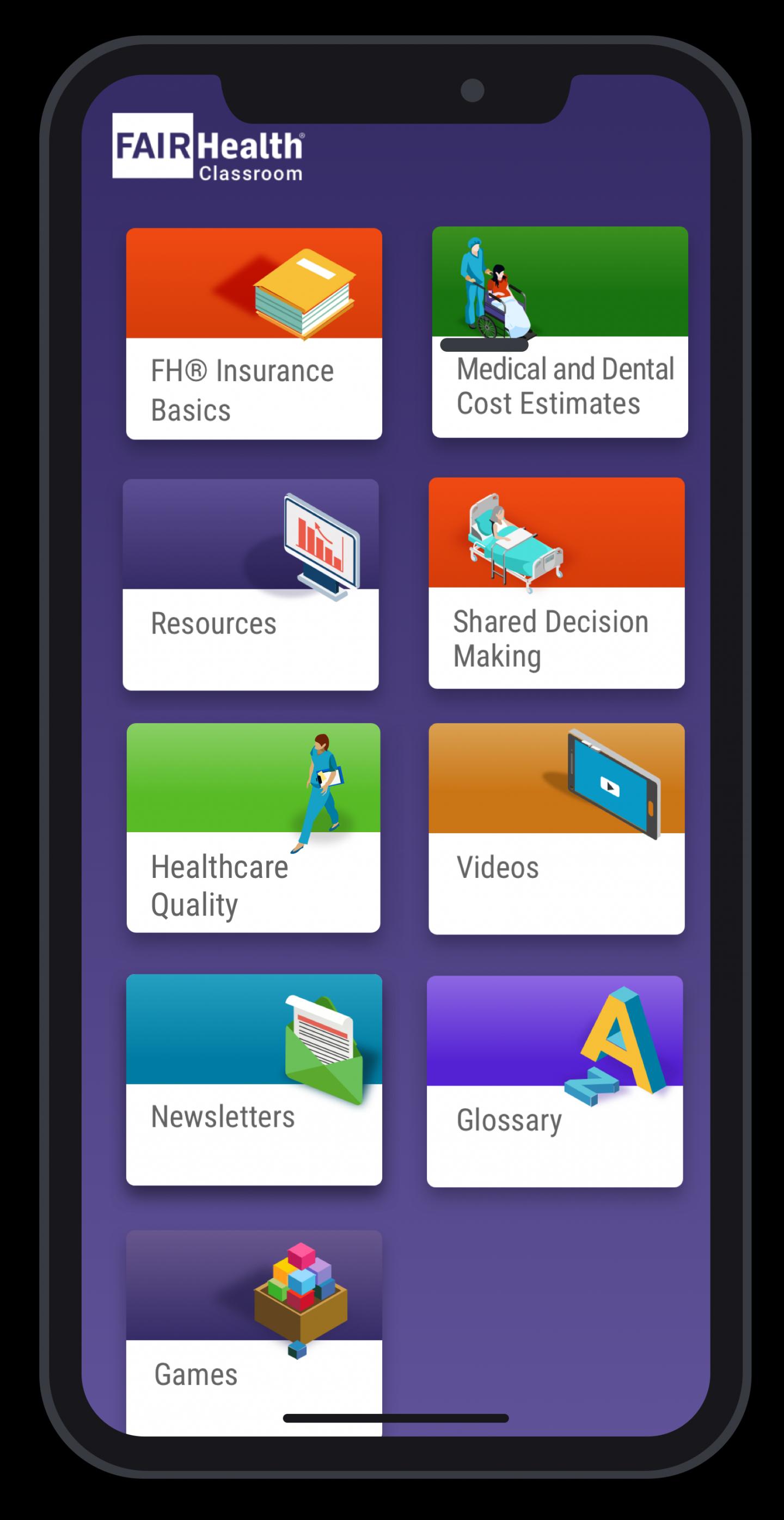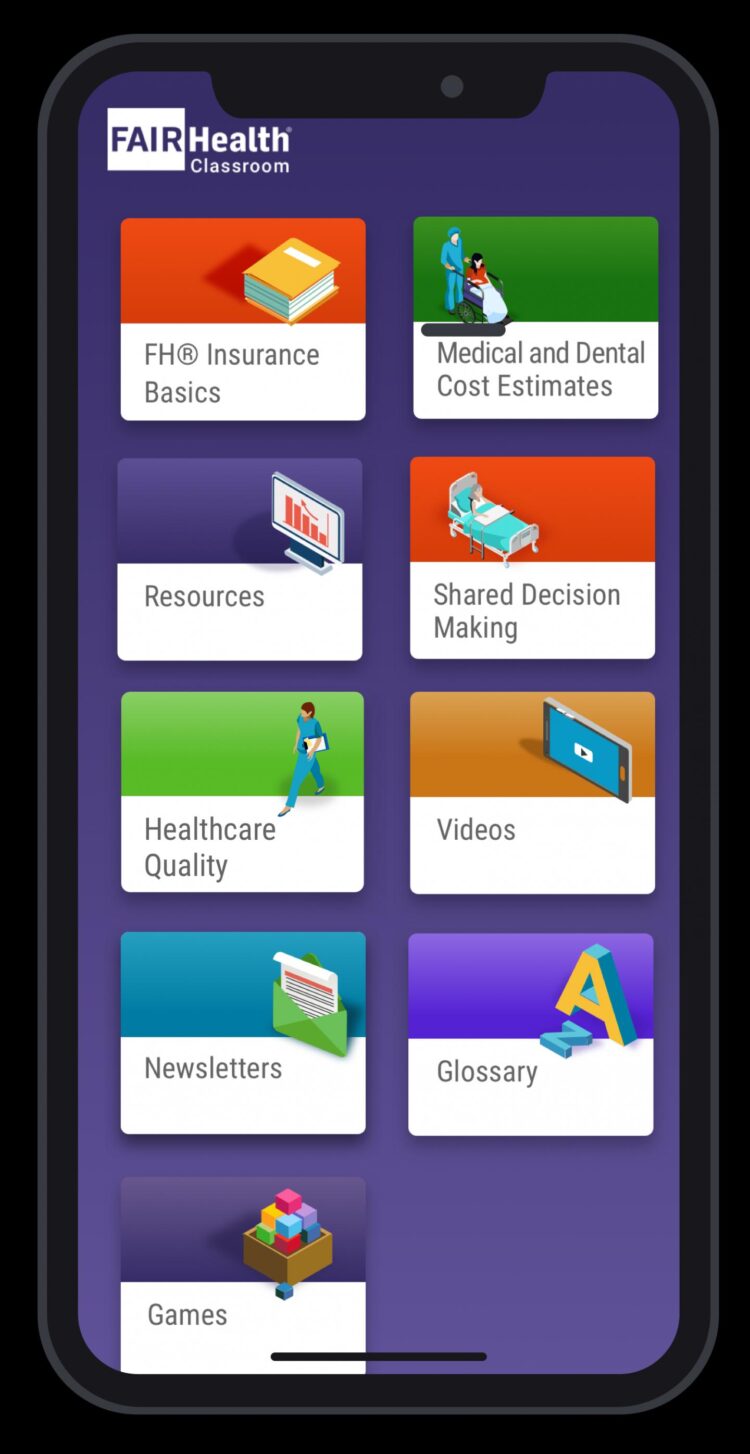New shared decision-making website for providers complements FAIR Health consumer website

Credit: FAIR Health
NEW YORK, NY–April 8, 2021–The national, independent nonprofit FAIR Health is unveiling three new enhancements to its platform of online resources to support consumers as they navigate the healthcare system. FAIR Health has added a shoppable services tool to its free, award-winning website, fairhealthconsumer.org; created a free website for providers about shared decision making to complement the consumer resources on that subject at FAIR Health Consumer; and launched a free mobile app, FH Consumer Classroom, to deliver health insurance education to consumers in a user-friendly, consolidated format.
Shoppable Services Tool
Shoppable services are nonurgent healthcare services that a patient can schedule in advance, such as cataract surgery, colonoscopies and CT scans. Beginning in 2021, federal regulation requires hospitals to list their prices for 300 shoppable services. While patients can go from hospital to hospital looking for these price lists, formats may differ, making comparisons difficult.
FAIR Health Consumer’s shoppable services tool takes a different approach. It allows consumers to browse through more than 300 shoppable services or search for a specific service, then get an estimate of the average cost of that service in the consumer’s geographic area or surrounding areas. Both in-network and out-of-network, geographic-specific costs are given. With this information, consumers can plan and budget for the service–especially important for those with high-deductible health plans. If consumers are uninsured or going out of network, they can use the cost estimate to negotiate with hospitals. For more on the new tool, see the article Shopping for Shoppable Services.
Shared Decision-Making Website for Providers
Shared decision making is the discussion between patients (and/or their caregivers) and clinicians to decide on care based on clinical evidence, balancing risks and outcomes with patients’ preferences and values. FAIR Health has now launched an educational website, fairhealthprovider.org, that supplies providers with free resources and tools to facilitate shared decision making. Funded by a generous grant from The Fan Fox and Leslie R. Samuels Foundation, the new site complements FAIR Health’s consumer-facing tools, which launched last year on FAIR Health Consumer. The tools combine clinical and cost information to support seriously and chronically ill patients and their caregivers in shared decision making with clinicians.
Materials on the new site include:
- An explanation and overview of shared decision making;
- Guidance and resources for shared decision-making implementation, such as provider- and consumer-facing checklists;
- Guidance for engaging in “triadic decision making” when a caregiver or family member is involved;
- Discussion prompts and conversation guides;
- Suggestions for further reading and resources, such as advance directives and tools to improve health insurance literacy; and
- Decision aids that combine clinical treatment options and associated costs for three palliative care scenarios:
- Dialysis for people who are seriously ill;
- Nutrition options for people who are seriously ill; and
- Ventilator for people who are seriously ill.
Lauren Weisenfeld, Deputy Director of the Healthy Aging Program at the Samuels Foundation, commented: “The Samuels Foundation is proud to support FAIR Health’s new provider-oriented website that offers educational content and tools aimed at supporting providers and clinicians in shared decision-making discussions with seriously ill older adults and their caregivers in New York City. This initiative is particularly relevant as patients, caregivers and providers are navigating difficult decisions in the context of the COVID-19 pandemic.”
FH Consumer Classroom Mobile App
Health insurance literacy and health literacy are more important now than ever, due to the impact of COVID-19 on the healthcare delivery system and the need to turn to alternative venues of care such as telehealth. FH Consumer Classroom, FAIR Health’s new mobile app, equips the consumer with critical information at this time of notable change. Available on the Apple App Store and Google Play, FH Consumer Classroom provides easy access to the educational materials also available on FAIR Health Consumer. The app offers FAIR Health’s award-winning consumer content on a new educational platform in a concise, user-friendly format.
FH Consumer Classroom enables users to learn about health insurance and healthcare quality through articles, videos and a glossary, and access key resources and interactive puzzles to support learning. Among the educational topics covered is shared decision making. The app also links to FAIR Health’s nationally recognized FH®Medical and Dental Cost Lookup tools, which enable consumers to estimate the typical costs of medical and dental procedures.
FAIR Health President Robin Gelburd stated: “Now more than ever, consumers are hungry for resources that enable them to navigate the complex world of healthcare and health insurance. FAIR Health has created these three enhancements to its consumer platform to support consumers as they make crucial decisions regarding their health and finances, and the providers who are assisting them.”
###
Follow us on Twitter @FAIRHealth
About FAIR Health
FAIR Health is a national, independent nonprofit organization that qualifies as a public charity under section 501(c)(3) of the federal tax code. It is dedicated to bringing transparency to healthcare costs and health insurance information through data products, consumer resources and health systems research support. FAIR Health possesses the nation’s largest collection of private healthcare claims data, which includes over 33 billion claim records and is growing at a rate of over 2 billion claim records a year. FAIR Health licenses its privately billed data and data products–including benchmark modules, data visualizations, custom analytics and market indices–to commercial insurers and self-insurers, employers, providers, hospitals and healthcare systems, government agencies, researchers and others. Certified by the Centers for Medicare & Medicaid Services (CMS) as a national Qualified Entity, FAIR Health also receives data representing the experience of all individuals enrolled in traditional Medicare Parts A, B and D; FAIR Health includes among the private claims data in its database, data on Medicare Advantage enrollees. FAIR Health can produce insightful analytic reports and data products based on combined Medicare and commercial claims data for government, providers, payors and other authorized users.FAIR Health’s systems for processing and storing protected health information have earned HITRUST CSF certification and achieved AICPA SOC 2 compliance by meeting the rigorous data security requirements of these standards. As a testament to the reliability and objectivity of FAIR Health data, the data have been incorporated in statutes and regulations around the country and designated as the official, neutral data source for a variety of state health programs, including workers’ compensation and personal injury protection (PIP) programs. FAIR Health data serve as an official reference point in support of certain state balance billing laws that protect consumers against bills for surprise out-of-network and emergency services. FAIR Health also uses its database to power a free consumer website available in English and Spanish, which enables consumers to estimate and plan for their healthcare expenditures and offers a rich educational platform on health insurance. An English/Spanish mobile app offers the same educational platform in a concise format and links to the cost estimation tools. The website has been honored by the White House Summit on Smart Disclosure, the Agency for Healthcare Research and Quality (AHRQ), URAC, the eHealthcare Leadership Awards, appPicker,Employee Benefit News and Kiplinger’s Personal Finance. FAIR Health also is named a top resource for patients in Dr. Marty Makary’s book The Price We Pay: What Broke American Health Care–and How to Fix It and Elisabeth Rosenthal’s book An American Sickness: How Healthcare Became Big Business and How You Can Take It Back. For more information on FAIR Health, visit fairhealth.org.
Media Contact
Dean Sicoli
[email protected]





